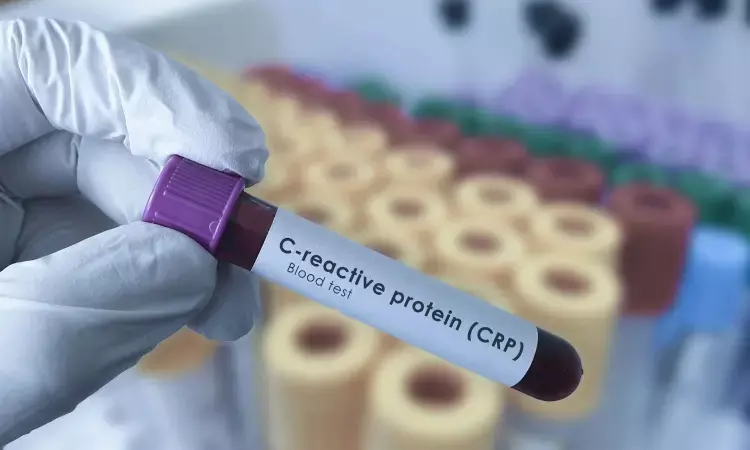- Home
- Medical news & Guidelines
- Anesthesiology
- Cardiology and CTVS
- Critical Care
- Dentistry
- Dermatology
- Diabetes and Endocrinology
- ENT
- Gastroenterology
- Medicine
- Nephrology
- Neurology
- Obstretics-Gynaecology
- Oncology
- Ophthalmology
- Orthopaedics
- Pediatrics-Neonatology
- Psychiatry
- Pulmonology
- Radiology
- Surgery
- Urology
- Laboratory Medicine
- Diet
- Nursing
- Paramedical
- Physiotherapy
- Health news
- Fact Check
- Bone Health Fact Check
- Brain Health Fact Check
- Cancer Related Fact Check
- Child Care Fact Check
- Dental and oral health fact check
- Diabetes and metabolic health fact check
- Diet and Nutrition Fact Check
- Eye and ENT Care Fact Check
- Fitness fact check
- Gut health fact check
- Heart health fact check
- Kidney health fact check
- Medical education fact check
- Men's health fact check
- Respiratory fact check
- Skin and hair care fact check
- Vaccine and Immunization fact check
- Women's health fact check
- AYUSH
- State News
- Andaman and Nicobar Islands
- Andhra Pradesh
- Arunachal Pradesh
- Assam
- Bihar
- Chandigarh
- Chattisgarh
- Dadra and Nagar Haveli
- Daman and Diu
- Delhi
- Goa
- Gujarat
- Haryana
- Himachal Pradesh
- Jammu & Kashmir
- Jharkhand
- Karnataka
- Kerala
- Ladakh
- Lakshadweep
- Madhya Pradesh
- Maharashtra
- Manipur
- Meghalaya
- Mizoram
- Nagaland
- Odisha
- Puducherry
- Punjab
- Rajasthan
- Sikkim
- Tamil Nadu
- Telangana
- Tripura
- Uttar Pradesh
- Uttrakhand
- West Bengal
- Medical Education
- Industry
Higher Plasma concentration of CRP linked with elevated risk of lung cancer

From the data of a new study conducted by Jian Yin and colleagues, it was shown that, particularly among non-obese participants, there was a dose-dependent connection between high-sensitivity CRP (hsCRP) and lung cancer risk in the Chinese population, indicating that C-reactive protein (CRP) might be used as a possible biomarker for predicting lung cancer risk and identifying high-risk individuals. The findings of this study were published in Cancer Prevention Research.
Multiple forms of cancer have been linked to the systemic marker of chronic inflammation known as C-reactive protein. The effect of CRP on lung cancer incidence in the Chinese population is not well understood, yet.
In all, 97,950 Kailuan Study individuals who were cancer-free at baseline (2006–2007) were monitored. At the baseline interview, all individuals had their plasma high-sensitivity CRP levels checked. The relationship between hsCRP concentrations and the incidence of lung cancer was evaluated using multivariable Cox proportional hazards regression models.
The key findings of this study were:
1. 890 incident lung cancer cases developed throughout the 8.7-year follow-up period, and they were separated into three groups based on the hsCRP level.
2. After controlling for covariates, the incidence of incident lung cancer was substantially higher in the high group compared to the low group with elevated levels of hsCRP.
3. Additionally, following BMI stratification, individuals with BMI24 and BMI=24-28, but not those with BMI28, showed statistically favorable relationships between the hsCRP level and the risk of lung cancer. Lung cancer development was influenced by an antagonistic interaction between hsCRP levels and BMI (Pinteraction=0.049).
In conclusion, the Authors found that lung cancer incidence is up to 42% more likely to occur when plasma levels of the inflammatory marker C-reactive protein are higher.
Reference:
Yin, J., Wang, G., Wu, Z., Lyu, Z., Su, K., Li, F., Feng, X., Guo, L.-W., Chen, Y., Xie, S., Cui, H., Li, J., Ren, J., Shi, J.-F., Chen, S., Wu, S., Dai, M., Li, N., & He, J. (2022). Association Between Baseline C-Reactive Protein and the Risk of Lung Cancer: A Prospective Population-Based Cohort Study. In Cancer Prevention Research (pp. OF1–OF7). American Association for Cancer Research (AACR). https://doi.org/10.1158/1940-6207.capr-21-0533
Neuroscience Masters graduate
Jacinthlyn Sylvia, a Neuroscience Master's graduate from Chennai has worked extensively in deciphering the neurobiology of cognition and motor control in aging. She also has spread-out exposure to Neurosurgery from her Bachelor’s. She is currently involved in active Neuro-Oncology research. She is an upcoming neuroscientist with a fiery passion for writing. Her news cover at Medical Dialogues feature recent discoveries and updates from the healthcare and biomedical research fields. She can be reached at editorial@medicaldialogues.in
Dr Kamal Kant Kohli-MBBS, DTCD- a chest specialist with more than 30 years of practice and a flair for writing clinical articles, Dr Kamal Kant Kohli joined Medical Dialogues as a Chief Editor of Medical News. Besides writing articles, as an editor, he proofreads and verifies all the medical content published on Medical Dialogues including those coming from journals, studies,medical conferences,guidelines etc. Email: drkohli@medicaldialogues.in. Contact no. 011-43720751


